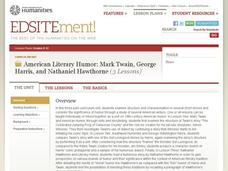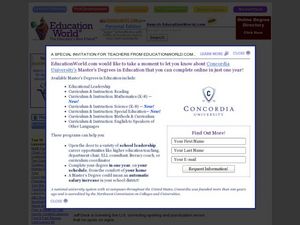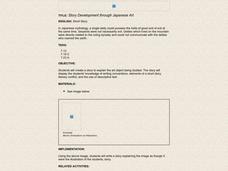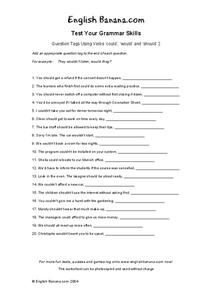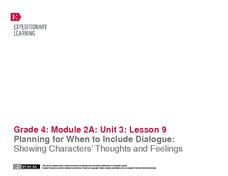National Endowment for the Humanities
American Literary Humor: Mark Twain, George Harris, and Nathaniel Hawthorne
Nathaniel Hawthorne as a humorist? Really? The three lessons in this series focus on the the storytelling style, conventions, and literary techniques employed by Hawthorne, George Washington Harris, and Mark Twain.
Curated OER
Figure of Speech
Examine the changing nature of language in the U.S. View and discuss excerpts from a PBS documentary with your class and then conduct Internet research, and complete a team project on the evolution of teen expressions.
Curated OER
The Great Eight: Teaching the Eight Parts of Speech
Integrate grammar activities and review into your daily classroom routine to facilitate practice and reinforcement of this vital skill.
Curated OER
Editor Travels U.S. Fixing Errors on Signs
An interesting article on editors helps young writers understand the conventions of written English. They read a news article about an editor traveling America correcting spelling and punctuation errors on signs. They discuss proper...
Curated OER
Teaching Social Studies in English
Case studies, an examination of images, and readings of passages from the UN Convention on the Rights of the Child are used to spark conversations in ESL/ELD social studies classes about this highly-charged topic. Using a variety of...
Children's Commissioner for Wales
Know Your Rights!
Children around the world enjoy a list of rights that protect their bodies, minds, families, and lifestyles. Review the United Nations Convention on the Rights of the Child with learners of all ages, and teach them all about their rights.
Ontario
Critical Literacy—Media Texts
Media texts convey both overt and implied messages. As part of their study of media, class members analyze the language, form, techniques, and aesthetics in a variety of media texts.
Curated OER
Solar System -- Writing Conventions
In this solar system worksheet, students learn writing conventions such as alliteration, similes, and acrostic poems. All pertain to the topic of space and solar system.
Curated OER
Language Arts: Stylistic Devices
Students are able to define given literary terms, such as metaphor, simile, imagery, personification, symbolism, etc. They are able to identify the use of literary elements in a given text. Students are able to interpret weather...
Curated OER
Language Arts: Awesome Authors Website
Students examine the writing techniques of professional authors and apply them to their own work. In pairs, they email authors to discover the tricks of the trade. Students create their own Website for their work.
Curated OER
Presidential Biography: Bicentennial Quarter
A biography is a type of literary genre that everyone needs to be familiar with. Here, the class will read two different biographies of George Washington and discuss how they are similar and different, then decide weather they can glean...
Curated OER
Story Development through Japanese art
A classic Japanese print is attached to this lesson plan and its up to your class to write a story about it. Pretending the image is an illustration, they use what they know about Japanese mythology to compose a short story describing...
Curated OER
Test Your Grammar Skills
Question tags are tough for English language learners. Print this practice sheet to help them use could, would, and should correctly. Twenty questions make up this instructional activity, and an answer page is included.
Curated OER
Question Tags Using Verbs Could, Would, and Should - 2
Help your English language learners develop grammar skills! There are 20 questions, and for each question the learner must use a question tag including could, would, or should. An answer sheet is included.
Curated OER
Does She? Doesn't She? Did She?
Designed for English language learners, this online, interactive activity has kids work with the phrases does she, doesn't she, and did she to complete 10 questions. Each answer is available directly below the question by clicking answer.
Curated OER
Capitalization and Punctuation
First and second graders explore writing conventions. They add question marks or periods to the end of teacher generated sentences on sentence strips. They locate punctuation marks in poems and write original sentences using appropriate...
Michigan Association of Intermediate School Administrators
Persuasive Essay: Grade 5
Improve your fifth graders' persuasive writing skills in four weeks. Working independently, in peer editing groups, and with instruction, writers work over the 17 sessions to craft an argumentative essay. They craft a well-organized...
EngageNY
Planning for When to Include Dialogue: Showing Characters’ Thoughts and Feelings
Young writers examine dialogue conventions, including indentation, quotation marks, and expressing thoughts and feelings through a fictional text. By noticing where and when authors use dialogue, they decide how to incorporate dialogue...
EngageNY
Grade 9 ELA Module 4, Unit 1, Lesson 28
As writers continue to revise their argument essays, the focus shifts to editing grammatical conventions, parallel structure, and varying syntax to add interest. After examining model sentences that demonstrate sentence variety, writers...
K12 Reader
Alliteration: Change the Adjectives
Work on a wonderful worksheet this Wednesday! Elementary scholars read ten pairs of adjective and noun pairs, and choose a synonym for each adjective to create an alliteration.
EngageNY
End of Unit 2 Assessment, Part 2: Revise Essay Drafts
Time to revise! Scholars revise their argument essays based on Shakespeare's A Midsummer Night's Dream using feedback from their teacher and peers. They begin their revisions after reviewing a mini-lesson plan on proper writing conventions.
EngageNY
Determining Cascading Consequences Using The Omnivore’s Dilemma: Industrial Organic Food Chain
Organic versus conventional farming: which option is best? Pupils use Michael Pollan's The Omnivore's Dilemma to determine the cascading consequences of the industrial organic food chain. They work in research teams to create an...
EngageNY
End of Unit Assessment Parts 1 and 2: Evaluating Arguments and Claims
Which came first: the chicken or the egg? As part of the end-of-unit assessment for The Omnivore’s Dilemma, scholars watch a video about organic eggs versus conventional farm eggs. They use graphic organizers to collect evidence as they...
Curated OER
Lesson Plan: Breaking the Rules
Breaking the rules isn't always a bad thing, sometimes it pushes the boundaries of the imagination. Young art enthusiasts examine the Kevin Red Star piece, Knows Her Medicine Crow Indian. They analyze how the artist broke rules during...
Other popular searches
- Language Conventions
- Written Language Conventions
- English Language Conventions
- Proper Language Conventions
- Language Arts Conventions


